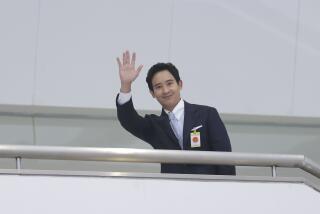Pakistani president can’t be party chief too, court rules
A provincial high court Thursday barred Asif Ali Zardari from maintaining dual roles as Pakistan’s president and head of the ruling party, a potential setback for a leader who has reeled from one crisis to another since taking office in 2008.
The Lahore High Court ruling could force Zardari to eventually choose between staying on as president and keeping his post as co-chairman of the Pakistan People’s Party, or PPP. However, a lengthy appeals process could stave off implementation of the court decision and Zardari could get the ruling reversed at the Supreme Court level.
For the time being, it did not appear that Zardari’s political power was in any immediate jeopardy.
The president’s camp “will say, ‘We respect the decision of the Lahore High Court and appeal to the Supreme Court,’” said Rasul Bakhsh Rais, a Lahore-based political analyst. “But he will continue to do what he is doing.
“The case may land in the Supreme Court, but the Supreme Court takes a lot of time. I don’t think Zardari will be in trouble immediately. Even if the Supreme Court upholds the Lahore ruling, Zardari could say, ‘I’m not engaged in any political activity.’”
Farahnaz Ispahani, a Zardari spokeswoman, declined to comment on the ruling, saying only, “The judgment will have to be examined in detail before any course of action is decided on.”
Sen. Babar Awan, a former federal law minister and close ally of Zardari, called the ruling unconstitutional.
“In this constitution, no where does it say that the president cannot take part in politics, nowhere,” Awan told reporters in Islamabad as he held up a copy of the document.
The ruling was the result of a petition filed by lawyer A.K. Dogar, who claimed that the constitution prohibits the president from taking part in any political activities. In handing down its 33-page ruling, the Lahore High Court agreed.
Political controversy, the court ruled, “can surround the high office of the president of Pakistan, whereby the trust and confidence of the people in the office is undermined, and therefore the dignity and authority of the state is eroded.”
Plagued by abysmal ratings, Zardari last year relented to widespread calls for a constitutional amendment that largely rolled back the presidency to a figurehead role and shifted much of its official power to the office of prime minister, held by Yousuf Raza Gilani. However, Zardari’s role as chief of the ruling party in effect gives him ultimate political control over the government and keeps Gilani in a subordinate role in the party’s hierarchy.
The ruling is the latest in a series of setbacks for Zardari, who became president soon after the death of his wife, former Prime Minister Benazir Bhutto, who was assassinated in December 2007 as she was preparing a political comeback. Zardari became leader of Bhutto’s Pakistan People’s Party, and in September 2008 he was elected president by the national and four provincial assemblies. He is up for reelection in 2013.
Zardari, 55, has been hampered by an antagonistic relationship with the country’s powerful military, which sees him as too pliant in his relations with the United States and intent on curbing the influence of the security establishment.
Last year, he became locked in a bitter battle with the nation’s Supreme Court, led by Chief Justice Iftikhar Mohammed Chaudhry, which sought to have old corruption cases reopened against Zardari.
His image among Pakistanis was further stained last summer, when in the midst of catastrophic floods that left millions homeless, he went ahead with a trip to Britain and France that many at home saw as a junket taken during the country’s hour of crisis.
More to Read
Sign up for Essential California
The most important California stories and recommendations in your inbox every morning.
You may occasionally receive promotional content from the Los Angeles Times.










